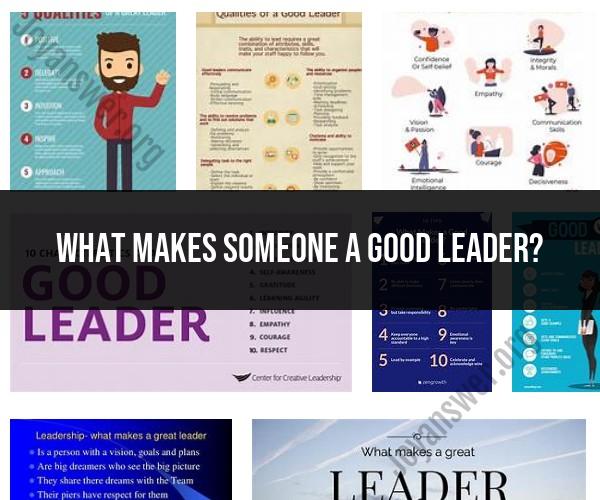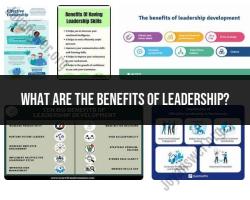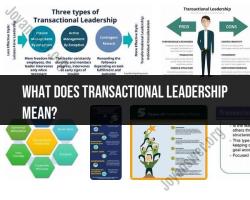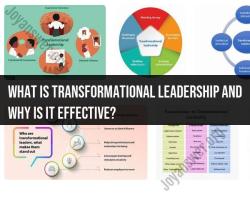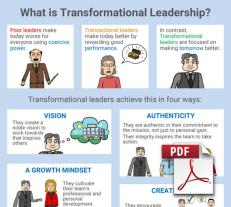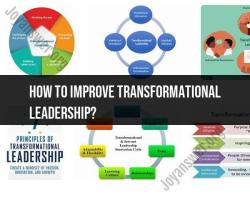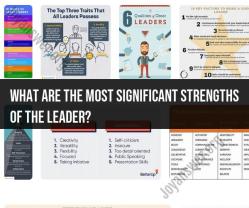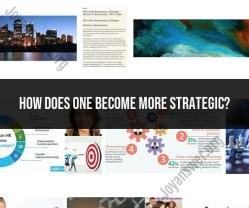What makes someone a good leader?
Good leadership is characterized by a combination of qualities and attributes that set effective leaders apart. While leadership styles can vary, certain qualities are generally considered essential for being a good leader. Here are some key qualities that make someone a good leader:
Vision: Good leaders have a clear vision of where they want to go and can communicate that vision effectively to inspire and motivate others. They have a sense of purpose and direction.
Communication Skills: Effective communication is crucial for leadership. Good leaders are adept at listening actively, expressing themselves clearly, and conveying their ideas to team members and stakeholders.
Empathy: Empathetic leaders understand the feelings and perspectives of others. They show genuine concern for the well-being of their team members and are supportive during both personal and professional challenges.
Integrity: Integrity is the foundation of trust. Good leaders are honest, ethical, and consistent in their actions and decisions. They lead by example and hold themselves accountable.
Decision-Making: Leaders must make decisions, often in complex or uncertain situations. Good leaders make well-informed decisions, consider the potential impact, and are willing to take calculated risks when necessary.
Adaptability: The business environment is constantly changing. Effective leaders are adaptable and open to new ideas. They can adjust their strategies and approaches as circumstances evolve.
Confidence: Confidence is important, but it should be balanced with humility. Good leaders believe in themselves and their abilities, but they are also willing to admit when they don't have all the answers.
Empowerment: Empowering team members means giving them the autonomy and authority to make decisions and take ownership of their work. Good leaders trust their team and delegate responsibilities accordingly.
Accountability: Leaders hold themselves accountable for their actions and decisions. They also establish a culture of accountability within their team or organization, where everyone is responsible for their contributions.
Inspiration: Good leaders inspire and motivate their team members to achieve their best. They encourage personal and professional growth and foster a sense of purpose and achievement.
Resilience: Leadership often involves facing challenges and setbacks. Resilient leaders remain composed under pressure, learn from failures, and bounce back with determination.
Conflict Resolution: Conflicts can arise in any team or organization. Effective leaders have strong conflict resolution skills, promoting healthy dialogue and finding solutions that benefit all parties involved.
Team Building: Leaders understand the importance of building cohesive and collaborative teams. They create an inclusive and supportive environment where team members work well together.
Time Management: Good leaders are skilled at managing their time effectively and prioritizing tasks. They set clear goals and help their team stay focused on achieving them.
Innovation: Leaders encourage innovation and creativity within their team. They are open to new ideas and support experimentation, which can lead to improvements and growth.
It's important to note that leadership is not a one-size-fits-all concept. Different situations and organizational cultures may require different leadership approaches. The most effective leaders are often those who can adapt their leadership style to meet the needs of their team and the demands of the situation while consistently embodying these core qualities.
Qualities and Traits of Effective Leadership
Effective leaders are those who are able to inspire, motivate, and guide others to achieve common goals. They possess a variety of qualities and traits that enable them to be successful, including:
- Vision: Effective leaders have a clear vision for the future and are able to communicate that vision to others in a way that is inspiring and motivating.
- Integrity: Effective leaders are honest, ethical, and trustworthy. They are role models for others and set high standards for themselves and their team.
- Communication: Effective leaders are able to communicate clearly and concisely, both verbally and in writing. They are also good listeners and are able to build rapport with others.
- Decision-making: Effective leaders are able to make sound decisions, even under pressure. They are able to weigh the pros and cons of different options and make the best decision for the team.
- Problem-solving: Effective leaders are able to identify and solve problems effectively. They are able to think critically and creatively and come up with innovative solutions.
- Delegation: Effective leaders are able to delegate tasks effectively. They are able to identify the strengths and weaknesses of their team members and assign tasks accordingly.
- Teamwork: Effective leaders are able to build and lead effective teams. They are able to create a positive work environment and foster collaboration and communication among team members.
Key Attributes That Make an Exceptional Leader
In addition to the qualities and traits listed above, exceptional leaders also possess the following attributes:
- Authenticity: Exceptional leaders are authentic and genuine. They are true to themselves and their values, and they lead by example.
- Empathy: Exceptional leaders are empathetic and understanding. They are able to put themselves in the shoes of others and see things from their perspective.
- Resilience: Exceptional leaders are resilient. They are able to bounce back from setbacks and failures and learn from their mistakes.
- Adaptability: Exceptional leaders are adaptable. They are able to change course quickly and effectively in response to changing circumstances.
- Passion: Exceptional leaders are passionate about their work and their team. They are able to inspire and motivate others to achieve their goals.
Developing Strong Leadership Skills and Style
Leadership skills can be developed and improved over time. There are a number of things that you can do to develop your leadership skills, including:
- Reflect on your strengths and weaknesses. The first step to developing your leadership skills is to reflect on your strengths and weaknesses. What are you good at? What areas do you need to improve in? Once you have a good understanding of your strengths and weaknesses, you can start to develop a plan for improvement.
- Set goals for yourself. Once you know what areas you need to improve in, set specific and measurable goals for yourself. For example, you might set a goal to improve your communication skills by taking a public speaking class.
- Find a mentor. A mentor can be a valuable resource for developing your leadership skills. A mentor can provide you with guidance, support, and feedback.
- Get involved in leadership development programs. There are a number of leadership development programs available, both online and in person. These programs can help you to develop your leadership skills and knowledge.
It is also important to develop a leadership style that works for you and your team. There is no one-size-fits-all approach to leadership. The best leadership style is the one that is most effective in helping you to achieve your goals and motivate your team.
There are a number of different leadership styles, including:
- Authoritarian leadership: Authoritarian leaders make all of the decisions and have complete control over their team.
- Democratic leadership: Democratic leaders involve their team members in the decision-making process.
- Laissez-faire leadership: Laissez-faire leaders give their team members a lot of autonomy and freedom.
The best leadership style for you will depend on your personality, your team, and the situation. It is important to be flexible and to adapt your leadership style as needed.
Developing strong leadership skills is an ongoing process. It takes time, effort, and dedication. However, the rewards of being a great leader are well worth the effort.
